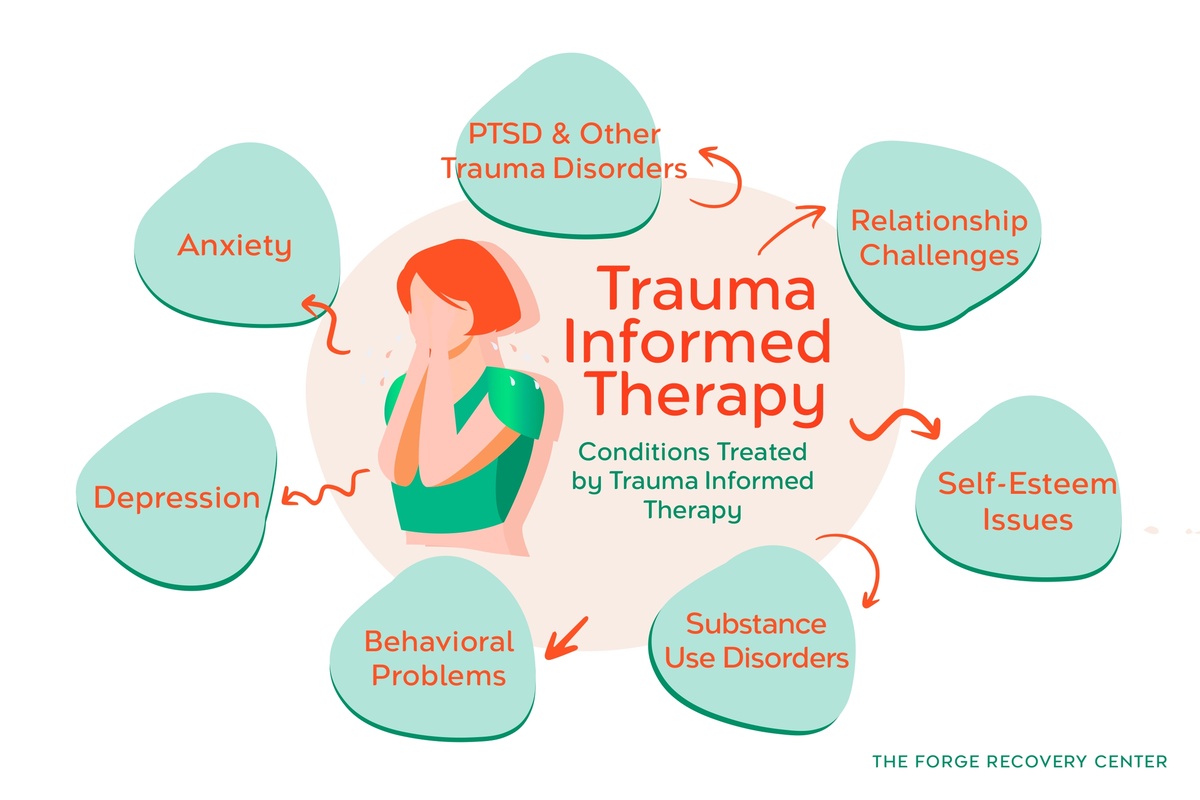Trauma-Informed Therapy: Understanding Trauma & How It's Treated


Trauma-informed therapy is a treatment method for addressing trauma-related conditions, mental health issues, and substance use disorders. It gets to the root of trauma by creating a safe environment and considering the impact of trauma on various aspects of life. Learn more about how it works and what it treats — and if you or someone you know could benefit from trauma-informed therapy, The Forge Recovery Center is here to guide you through the next steps.
What Is Trauma-Informed Therapy?
Trauma-informed therapy is an approach to providing mental health treatment that recognizes the widespread impact of trauma on individuals. This type of therapy emphasizes creating a safe and supportive environment for clients, understanding the signs and symptoms of trauma, and tailoring treatment to address the specific needs that arise from traumatic experiences.
Therapists who practice trauma-informed therapy are trained to be sensitive to the unique challenges faced by individuals who have experienced trauma, and they work collaboratively with clients to promote healing and resilience. By incorporating a trauma-informed approach, therapists aim to empower clients to process their experiences, build coping skills, and ultimately work toward recovery and growth.
Core Principles
Trauma-informed therapy is grounded in the understanding that informed care is essential for individuals who have experienced trauma. It emphasizes safety, trustworthiness, choice, collaboration, and empowerment. This approach recognizes the widespread impact of trauma and aims to create a supportive environment for healing.
A Holistic Approach
Trauma therapy takes a holistic approach by addressing not only the psychological aspects of trauma but also the physical, emotional, and spiritual effects. By considering the interconnected nature of these elements, therapists help you navigate through past traumas and build resilience for your future well-being.

Conditions Treated by Trauma-Informed Therapy
Trauma-informed therapy primarily treats PTSD and other trauma-related disorders, but its uses have spread to other mental health conditions as well. People with anxiety, depression, behavioral problems, or substance use disorders can also benefit from this form of treatment. Here’s an overview of the conditions that can be tended to by trauma-informed therapy:

PTSD & Other Trauma Disorders
When you seek trauma-informed therapy, you acknowledge the profound impact of trauma on conditions like PTSD. Through specialized techniques, you can effectively cope with PTSD symptoms and address various trauma-related disorders.
In trauma therapy, you delve into past experiences to understand how they manifest in present-day struggles. By recognizing these connections, you can work towards healing and overcoming the challenges posed by trauma disorders.
Anxiety
Trauma therapy equips you with tools to manage anxiety symptoms stemming from past traumatic events. By exploring the link between trauma and anxiety, you gain insight into how tailored strategies in therapy can alleviate anxiety issues effectively.
The personalized approaches in trauma therapy focus on addressing the root causes of anxiety, allowing you to develop healthier coping mechanisms. These strategies empower you to navigate anxiety triggers and regain a sense of control over your emotions.
Depression
Through trauma therapy, you receive support in navigating depressive symptoms influenced by past traumatic experiences. By understanding the role of trauma in shaping depression, you can work towards building resilience and fostering emotional well-being.
Empowering techniques utilized in trauma therapy aims to combat feelings of hopelessness and despair associated with depression. As you engage in therapy, you learn to reframe negative thought patterns and cultivate a more positive self-image.
Behavioral Problems
In trauma therapy, therapists assist individuals in managing behavioral issues stemming from unresolved traumas. By identifying underlying reasons for these problems, therapists help clients develop effective coping mechanisms to navigate challenging behaviors.
Through targeted interventions, individuals learn to regulate their responses to triggers and adopt healthier behavioral patterns. Trauma-focused therapies provide valuable tools for understanding and addressing behavioral challenges effectively.
Substance Use Disorders
Understanding the link between trauma and substance use disorders is crucial in addiction recovery within trauma-informed therapy settings. Through specialized interventions, individuals receive support in overcoming addictive behaviors rooted in past traumas.
Tailored strategies employed in trauma therapy focus on addressing both the addiction itself and the underlying emotional wounds driving substance abuse. By exploring these connections, individuals can embark on a path toward lasting recovery.
Self-Esteem Issues
Trauma therapy offers a safe space for addressing self-esteem challenges resulting from past traumas. By implementing tailored strategies, therapists help you boost self-esteem and rebuild confidence that may have been eroded by traumatic experiences.
Exploring the impact of past traumas on self-worth allows you to recognize and challenge negative beliefs about yourself. Through therapeutic interventions, you embark on a journey towards reclaiming a healthy sense of self-esteem.
Relationship Challenges
Trauma therapy plays a vital role in addressing relationship difficulties stemming from past traumas. By delving into the impact of previous traumatic experiences on interpersonal connections, therapists help individuals navigate relational challenges with greater awareness.
Empowering techniques utilized in trauma therapy foster improved communication skills and emotional regulation within relationships. Through this process, individuals learn to cultivate healthier dynamics and establish stronger connections with others.
Are You Struggling with Mental Health or Addiction?
We Can Help. Call Us Now!
CALL: 877-839-1772
Understanding Trauma
To understand how trauma-informed therapy works, it’s important to know its foundations. Here’s an overview of the impact of trauma, the different types of trauma, and common drivers (including substance use and addiction):
Trauma, Defined
Trauma refers to experiences that overwhelm your ability to cope, leaving lasting effects on mental health. It can manifest in various forms such as physical, emotional, or psychological trauma. The impact of trauma on your well-being can be profound, affecting your emotional stability and overall quality of life.
Types of Trauma
Different types of trauma include interpersonal trauma, such as abuse or neglect, and community violence.
Trauma therapy addresses a wide range of traumas, including those related to natural disasters or accidents.
Substance use disorders often stem from underlying trauma, making trauma-informed therapy crucial for effective treatment.
Sources of trauma vary from childhood adversity to adult experiences like combat exposure or medical trauma.
Impact on Quality of Life
Understanding how trauma affects your quality of life is essential. Untreated trauma can lead to issues like chronic stress, anxiety disorders, and depression. The long-term consequences of unaddressed trauma can significantly impact your well-being and relationships. However, through trauma-informed therapy, you can experience significant improvements in your quality of life.
How Does Trauma-Informed Therapy Work?
Trauma-informed therapy has a set of core principles that it’s guided by, as well as certain techniques used to build trust, motivate patients, and personalize the process. Here’s how it works:
Core Principles
When it comes to trauma-informed therapy, understand that it is guided by core principles. Safety, trust, and empowerment are crucial in trauma therapy. This approach prioritizes compassion and support for individuals struggling with past traumas.
Trauma-Informed Vs. Traditional Therapy
Differentiate between trauma-informed therapy and traditional approaches. Trauma-informed care emphasizes past traumas for healing, while traditional therapy may focus on current issues. The benefits of trauma-informed care include a more holistic and comprehensive approach to addressing trauma.
Techniques Used
Building Trust
In trauma therapy, building trust is essential for effective treatment outcomes. The therapeutic relationship plays a significant role in helping individuals feel safe and supported. Strategies such as active listening, empathy, and consistency are employed to establish trust between individuals and therapists.
Empowering Individuals
Trauma therapy aims to empower individuals to take control of their healing journey. Self-empowerment is crucial in trauma recovery as it helps survivors regain a sense of agency and autonomy. Techniques like mindfulness, self-care practices, and goal-setting are utilized to build resilience and self-confidence in trauma survivors.
Tailored Strategies
Trauma therapy customizes strategies to meet the unique needs of each individual. A personalized approach allows therapists to address specific trauma-related challenges effectively. Tailored techniques such as cognitive-behavioral therapy, EMDR (Eye Movement Desensitization and Reprocessing), and art therapy are used to support individuals in their healing process.

Are You Struggling with Mental Health or Addiction?
We Can Help. Call Us Now!
CALL: 877-839-1772
Challenges of Trauma-Informed Therapy
Trauma-informed therapy isn’t without its challenges. Trauma is a complex subject that manifests differently in everyone, making it difficult to identify and navigate. It can also be difficult to build trust between therapists and clients due to feelings of betrayal or abandonment caused by trauma. Let’s explore these challenges further:
Understanding Complexity
When addressing trauma-related issues in therapy, you may encounter various challenges due to the complexity of trauma itself. Trauma can manifest differently in individuals, making it challenging to identify and treat effectively.
Navigating the intricacies of trauma requires therapists to be highly attuned to clients' emotional responses and triggers. This heightened sensitivity can be emotionally draining for therapists, impacting their own well-being.
Overcoming Obstacles
To overcome obstacles in trauma therapy, therapists often employ a range of strategies. These include creating a safe and supportive environment where clients feel comfortable expressing their emotions without judgment.
Utilizing evidence-based techniques such as cognitive behavioral therapy (CBT) or eye movement desensitization and reprocessing (EMDR) can help clients process traumatic experiences effectively. These approaches enable clients to reframe negative thought patterns and reduce the impact of past traumas on their present lives.
Building Trust
Establishing trust is crucial in trauma therapy, as many clients may have experienced betrayal or abandonment in the past. Therapists must demonstrate empathy, compassion, and consistency to build a strong therapeutic alliance with clients.
By fostering a trusting relationship, therapists can create a secure space for clients to explore their trauma history openly and work towards healing. This trust forms the foundation for effective therapeutic interventions and positive outcomes in trauma recovery.
Self-Care Practices
Given the intense nature of trauma therapy, it is essential for both therapists and clients to prioritize self-care practices. Encouraging clients to engage in activities that promote relaxation and stress relief can enhance their coping mechanisms outside of therapy sessions.
Similarly, therapists need to practice self-care to prevent burnout and maintain their emotional resilience. Engaging in regular supervision, seeking peer support, and setting boundaries are vital aspects of self-care for mental health professionals working with trauma survivors.
Trauma-Informed Therapy Success & Statistics
Trauma-informed therapy poses varying success rates depending on the individual. Here’s a roundup of the latest statistics to give you an idea of the efficacy of this treatment modality:
Positive Outcomes
According to a recent study, patients who received trauma-informed therapy saw a 30% decline in PTSD symptoms from baseline to termination. Another study concluded that trauma-informed interventions significantly reduced PTSD symptoms in 11 out of 23 studies, highlighting its varying but proven effectiveness.
Effectiveness Data
Statistics indicate that trauma-informed care is highly effective in treating trauma-related conditions. Research shows that about 40% of individuals who undergo this type of therapy show a clinically significant change, proving that this structured approach yields positive outcomes for many.
Are You Struggling with Mental Health or Addiction?
We Can Help. Call Us Now!
CALL: 877-839-1772
Getting Started with Trauma-Informed Therapy
If you’re ready to start trauma-informed therapy, your first step is to find a therapist or mental health and addiction treatment center for support. There are plenty of other resources to help your recovery journal as well, such as community mental health centers and referrals from your primary care provider. Here’s how you can get started:
Finding a Therapist
When seeking trauma-informed therapy, start by researching therapists in your area. Look for professionals experienced in trauma treatment and certified in evidence-based therapies.
Begin by reaching out to potential therapists and scheduling initial consultations. Discuss their approach to trauma therapy and ensure they align with your needs.
Mental Health & Addiction Treatment Centers
Inpatient and outpatient addiction treatment centers can provide trauma-informed therapy for individuals with substance use disorders. These centers offer integrated care addressing both addiction and underlying trauma issues.
Trauma-informed therapy at addiction treatment centers involves a multidisciplinary approach, including counseling, group therapy, and specialized trauma interventions. This comprehensive treatment aims to address the root causes of addiction.
Available Resources
For those seeking trauma therapy, various resources are accessible to support your journey. Consider online directories, community mental health centers, and referrals from primary care providers.
Support groups and online forums can also be valuable resources for individuals undergoing trauma therapy. Engaging with others who have similar experiences can provide comfort and understanding.
Closing Thoughts
You now understand the essence of trauma-informed therapy, its applications, and how it functions. Recognizing trauma's impact is crucial in providing effective therapy. Despite the challenges, the success rates and statistics validate the significance of this approach. Getting started with trauma-informed therapy can be a transformative step towards healing and growth for those who have experienced trauma.
Take the first step today by exploring how trauma-informed therapy can benefit you or someone you care about. Empower yourself with knowledge and resources to navigate the journey towards healing and well-being. Your decision to embrace trauma-informed therapy could mark the beginning of a profound transformation in your life.
Are You Struggling with Mental Health or Addiction?
We Can Help. Call Us Now!
CALL: 877-839-1772
Trauma-Informed Therapy at The Forge Recovery Center: Call Us Today!
Trauma-informed therapy offers hope not only for people with trauma-related conditions, but also mental health issues and substance use disorders. If you or a loved one are facing any of these struggles, know that you’re not alone on your path to recovery. The Forge Recovery Center is here to help with a committed team of mental health and treatment experts who’ll guide you toward healing, every step of the way.
Call The Forge Recovery Center today to learn more about our trauma-informed therapy options, so that you can access the care you need and deserve.


